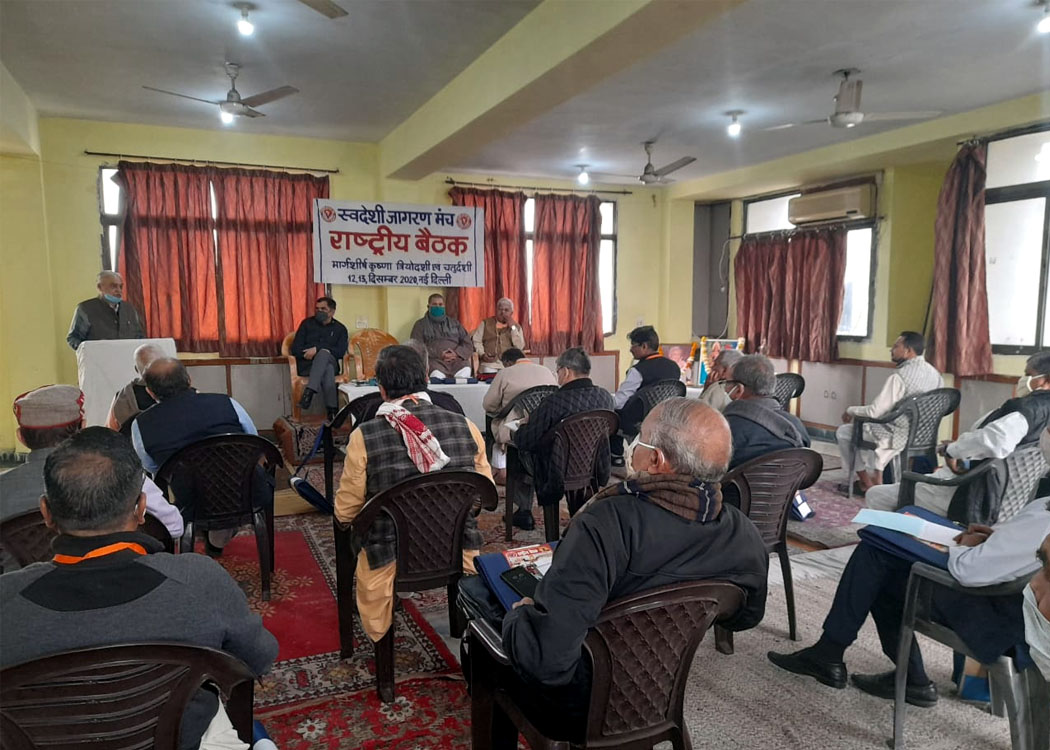
Resolution-1 (14th Rashtriya Sammelan (Digital) of SJM (December 12-13, 2020, New Delhi))
Change FDI Norms to Block Entry of MNCs in New Retail Format
Indian Retail sector is one of the fastest markets in the world. It contributes 10% to our GDP Retail trade sector is one of the prime employment provider in our country and contribute 8% to employment. 89% of the Retail trade is traditional retail, 9% is organised retail and 3% is e-commerce. More than 50 Million people are involved in traditional retail with more than 20 Million outlets of small or very small sizes. The sector has not only generated employment but has also provided ample opportunities to the younger generation to show their entrepreneurial skills. Retail trade has eased pressure on public sector as well as the Government to provide employment opportunities to a very large young population which enters the market every year.
In this background, the Government has restricted entry of multinational companies in retail trade. Foreign Direct Investment Policy of the Government, has not permitted FDI in inventory model of multi-brand retail trade. However, to ensure that the sector make use of the latest technological developments, it has permitted MNCs to operate in multi-brand retail sector with Market Place Model where, they facilitate the local players to sell their products and to the consumers to buy the products online. It is worth noting that MNCs have been flouting the norms prescribed for them to operate in Market place Model. The same have been pointed out by SJM from time to time to the Government but its response is not at desirable level.
In a separate development, the Essential Commodities Act has been amended and restrictions on quantitative storing of all agro products has been removed for exporters, super markets and large wholesalers.
In the last few months, we have witnessed another development in multi brand retail sector and that is MNCs are increasing their presence in organised retail in India. The MNCs are now collaborating with major local players to create Omni channel retail model where the arrangement has been made in a very cunning manner so that MNCs can carry on multi brand retail trade in India by circumventing FDI policy restrictions on them.
The most prominent example is investment by Facebook, which also owns WhatsApp in Jio Platforms Ltd, a company promoted by Reliance Industries Ltd. Jio Platforms consist of Jio Telecom Ltd, owner of a large telecom market in India. TV 18, a media Group of companies and Jio-Mart, an e-commerce market place.
Reliance Retails Ventures Ltd, another wholly owned subsidiary of Reliance Industries Ltd, is a major player in organised retail and owns 1800 physical retail stores under the brands 'Reliance Retails', Reliance Fresh' etc. It has recently acquired retail business of Future Group also which owns brand like "Big Bazaar, FBB, Central Food Hall". This acquisition shall also allow Reliance Retails to control very large logistics and warehousing infrastructure. Reliance Retails has also acquired 'Netmeds', an e-pharmacy. Reliance Retails has also attracted substantial investment by MNCs in the company.
Jio Platforms Ltd and Reliance Retails Ventures Ltd has launched 'Jio Mart- Desh ki Aapni Dukaan', a multi brand retail business model where customers will be able to select product online for which delivery shall be made through kirana stores being registered as last mile connectivity with the consumer.
It can be observed from this development that:
- MNCs would be able to participate in 'Inventory Based Model' in multi brand retail trade where otherwise FDI is not permitted
- Reliance Retail and Big Bazaar will dominate over other players in the multi-brand retail in physical format such as Dmart, Croma etc.
- Local Kirana Stores shall be transformed into fulfilment centres for Jio Mart.
- Wholesalers shall be converted in warehousing lots for JioMart and Reliance Retail.
- Reliance Retails shall be in a position to purchase and store and warehouse a very large quantity of agro products.
- Medical stores and pharmacies will have to compete with online sellers like Reliance Retails.
It is suspected that more than 38% of retail market shall be with Reliance Industries Ltd alone. These developments would result in monopolistic situation where a single party shall not only be able to exploit suppliers and farmers by making purchases at cheaper rates but would also be able to exploit the consumers by offering goods at higher prices in the absence of competition in the market.
SJM demands that:
- This nexus of MNCs and Indian business houses, which shall be detrimental to not only a very large population engaged in multi brand retail in the shape of local Kirana Stores, manufacturers in the micro and small industry sector as well as to the consumers at large, should not be allowed to operate in India.
- Government of India should examine critically the real impact of such development on the overall employment in the unorganised retail as well as on the consumers at large.
- Sale of medicines through e-commerce should not be permitted keeping in view the law if the land and its likely impact on health safety of the population.
- FDI norms should be suitable amended to block the entry of MNCs in multi brand retail trade in India in any format directly or indirectly.


